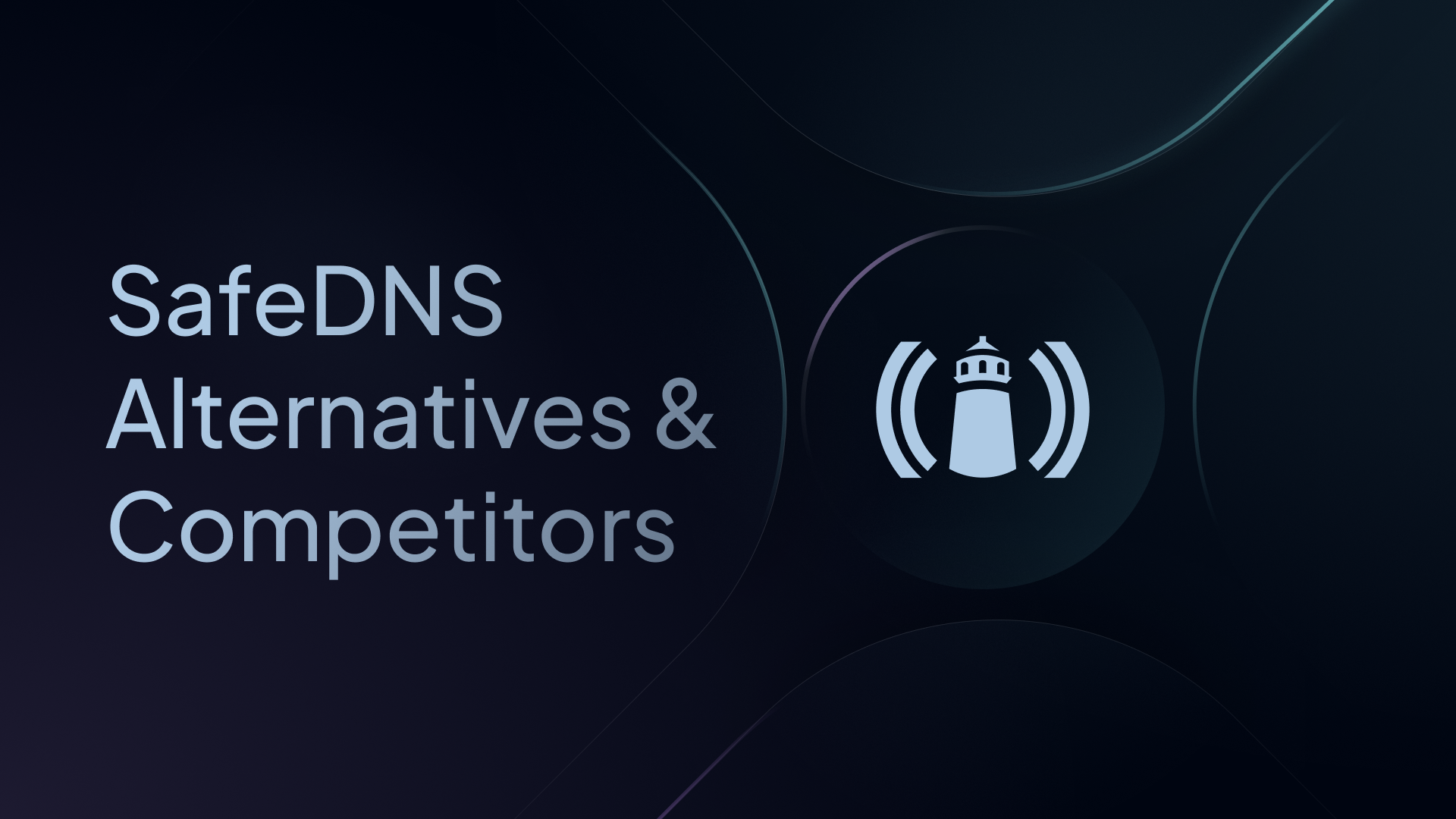8 Best SafeDNS Alternatives & Competitors
We explore the top eight SafeDNS competitors, to help you find the best fit for your business or organization.

When it comes to DNS filtering and internet security, SafeDNS is a reliable choice, but it may not meet every organization’s needs.
From advanced content filtering to flexible integrations and cost-effective plans, several strong alternatives exist, with some even surpassing SafeDNS’s capabilities.
In this article, we’ll explore the top eight SafeDNS competitors, highlighting each one’s unique strengths to help you find the best fit for your business or organization.
1. Control D (Best All-Round Solution)
Pricing
SafeDNS has three plans with varying feature offerings. It starts with the Basic plan at $1/user/month, Pro at $1.8/user/month, and finally, the Pro+ plan at $2.5/user/month.
Each subsequent plan has increased functionality, with the Pro+ plan having the most features available. Since the Basic plan only offers basic phishing and malware protection, web filtering, and the ability to enforce policies by groups, you’ll likely have to start with the Pro plan.
Control D does not offer plans but charges a per-endpoint fee based on your organization type:
- School/Non-Profit: $0.50/endpoint/month
- MSP: $1/endpoint/month
- SMB: $2/endpoint/month
- Enterprise: Contact
Due to this pricing structure, all organization types receive the entire suite of features Control D has to offer from the beginning, with no additional charges for future feature releases and functionality.
SafeDNS could be a more affordable option, depending on your requirements, or it may be considerably more expensive if your use case requires the Pro+ plan. It also depends on whether your business is an MSP or an organization since MSPs will find Control D to be more cost-effective. As such, we’ve ranked this category as a tie.
Features
There isn’t a single feature SafeDNS offers that Control D does not. However, some features are exclusive to Control D, such as:
- Blockable Services – Control D has over 1,000 apps, platforms, and groups of websites to choose from, whereas SafeDNS’s AppBlocker has a limited selection and can only block app categories.
- Geo-Custom Rules
- Traffic Redirection
It should be noted that features like SIEM log streaming are only available on SafeDNS’s Pro+ plan.
When factoring in that Control D’s full feature set is available to all users as soon as you sign up – whereas you may have to upgrade to SafeDNS’s Pro+ plan in the future if your requirements change – Control D wins this category.
Onboarding & UX
Both services offer a simple and straightforward onboarding experience. Here are some reviews for SafeDNS.
Control D is no different, with users praising its user-friendly UI, easy-to-use service, and seamless onboarding experience.
Analytics & Reporting
Control D also competes with SafeDNS in the analytics and reporting category. One slight difference is that SafeDNS keeps stats and logs for up to 1 year, which can be exported at any time.
On the other hand, Control D offers 30 days of granular log data, and reports are kept for 30 days with hourly time-series granularity or 1 year with daily time-series granularity.
Another thing to consider is that Control D allows you to choose three data storage regions (NA, EU, or ANZ) and offers custom storage regions for an additional cost, which SafeDNS does not.
Support
Let’s first dive into the similarities between the two services regarding support. Both offer:
- Documentation and knowledge base
- Email support
- Chat support
However, Control D’s chatbot – called Barry – is an advanced chatbot powered by machine learning technology. It consists of the collective knowledge of all Control D employees and the extensive documentation available. This means that 99% of queries can be answered within seconds without speaking to a human agent.
One difference between Control D and SafeDNS is that Control D gives you a dedicated manager who will be your point of contact. While SafeDNS also offers a dedicated manager, it is only available on the Pro+ plan.
Something to also consider is community support. Control D also has an active Reddit and Discord community, which SafeDNS does not.
In terms of the quality of support received, Control D shines in this department. There are numerous reviews online praising how fast they respond to queries and the quality of response received.
What's more, many tickets are responded to by staff engineers well within the 24-hour service level agreement.
On the flip side, some users have expressed that the support received from SafeDNS can sometimes be below par.
Final Thoughts
SafeDNS is a dependable solution that can serve almost all business needs. It has competitive pricing and offers a strong list of features. However, when examined as a total package, it lags behind Control D.
Control D offers considerably more features to allow for granular customization over your network and devices, greater support, and robust analytics and reports. When considering both service’s pricing structures, Control D delivers more value.

2. DNSFilter
DNSFilter is known for its high-speed query response times and solid content-filtering capabilities. It offers a range of features including:
- AI-driven malware protection
- Customizable content filtering
- Full query logging
- Blockable Services (80+ using their AppAware feature)
Despite its strengths in speed and filtering capabilities, DNSFilter has some limitations. Its server uptime and reliability are typically lower than many of its competitors, potentially impacting consistency for users who prioritize dependable performance.
DNSFilter’s pricing can also be a drawback, as features like a permanent API token, SIEM log streaming, and exporting data require an additional $0.25/user/month on top of the $2/user/month Pro Plan, making it a pricier option compared to some other services.
Furthermore, DNSFilter lacks support for Linux, modern DNS protocols, and dual-stack functionality, which may restrict its usability in certain environments.
👉 Read our head-to-head comparison of Control D vs DNSFilter
3. WebTitan
WebTitan, developed by TitanHQ, is a DNS filtering solution that caters to MSPs looking for reliable and straightforward web security.
It provides essential features such as advanced malware protection, flexible content filtering, detailed per-user reporting, and API access, making it a practical choice for companies that value functionality and integration options.
However, WebTitan does have some limitations compared to other DNS filtering solutions like Control D. It does not support Geo-IP blocking or a customizable list of blockable Services, which can be a drawback for those needing more granular network control.
At a competitive price point of $2.25/user/month (paid annually) for businesses, WebTitan remains a sound option for organizations that prioritize core security features over advanced customization.
4. Zorus
Zorus is a DNS filtering solution that appeals to MSPs. It offers essential DNS management capabilities without unnecessary complexity, with features such as malware and phishing protection, customizable content filtering, Geo-IP blocking, and API access, which are valuable for basic DNS filtering needs.
However, Zorus has some limitations that may affect organizations with more diverse requirements. It lacks support for iOS and Android devices, and its MacOS client is currently in beta, making it less versatile for those seeking full multi-device compatibility.
Furthermore, Zorus does not provide SIEM log streaming, which could be a drawback for businesses that rely on comprehensive logging and data analysis for security monitoring.
5. ScoutDNS
ScoutDNS is a DNS filtering service offering a practical selection of features for straightforward DNS management. It provides:
- Customizable content filtering
- Allow/blocklists tailored to specific policies or clients
- Full API access
However, ScoutDNS has a few notable limitations that may be restrictive for those with more varied use cases. It does not support mobile devices like iOS and Android, lacks DNS-over-TLS (DoT) support, and does not provide advanced features like Geo-custom Rules or Traffic Redirection.
While ScoutDNS is a budget-friendly option focusing on fundamental DNS filtering, it may fall short for organizations that require advanced features, broad device compatibility, or complex DNS management.
For businesses with these needs, alternatives like Control D provide a more versatile set of features at a comparable price.
6. DefensX
DefensX is a DNS-based security solution built with MSPs in mind. Served as a secure web browser, its features include flexible content filtering, detailed query logging, remote browser isolation, and seamless integration with RMM tools, making it a practical choice for streamlined device management.
Although DefensX offers three plans – Core, Core+, and Premium – for functionality such as SIEM log streaming, scheduled reporting, and full API access, you must subscribe to the Core+ or Premium plan.
While DefensX receives positive feedback for its dependable customer support, some users express concerns about its slower pace of product development and feature updates.
7. Cloudflare Gateway
Cloudflare Gateway is a DNS filtering service designed primarily for large enterprises, and is built to be integrated within Cloudflare’s expansive Zero Trust suite. Most users seeking robust filtering and DNS management features must opt for the Pay-as-you-go plan, priced at $7/user/month, since the Free plan has limited functionality.
The Pay-as-you-go plan includes features like:
- Malware and phishing protection
- Full API access
- Detailed query logging
- Geo-IP blocking
- Integration with RMM tools
However, if you require features like SIEM log streaming and per-user reporting, you’ll have to sign up for the Contract plan which will significantly add to the overall per-month cost.
Cloudflare Gateway’s feature set is comprehensive and beneficial for organizations with extensive DNS filtering requirements and large budgets, but it may be an expensive choice for businesses that do not fit that criteria.
For companies needing similar capabilities at a more accessible price, alternatives like Control D offer comparable features at a considerably lower price point.
👉 Read our post on the 8 best Cloudflare DNS alternatives.
8. Cisco Umbrella

Like Cloudflare Gateway, Cisco Umbrella is a DNS security solution that caters to large enterprises. It’s packed with features like malware blocking, Geo-IP filtering, and compatibility with all types of devices.
However, Umbrella’s effectiveness is enhanced only when fully integrated with other Cisco products, which makes it best suited for organizations deeply invested in the Cisco ecosystem.
Navigating Cisco Umbrella’s range of offerings can be challenging, as each plan aligns with different Cisco services and may require assistance from a sales representative to determine the right fit.
Additionally, customers should note that Cisco’s Roaming Client will be retired on April 2, 2025, requiring users to shift to the Cisco Secure Client, which adds another step in an already layered onboarding experience.
Cisco Umbrella is ideal for enterprises already embedded in Cisco’s ecosystem but may not be as straightforward for those seeking a more streamlined DNS solution.
How Should You Choose the Right SafeDNS Alternative?
Consider the following criteria:
- Pricing
- Features
- Customizability
- Onboarding & UX
- Analytics
- Support


